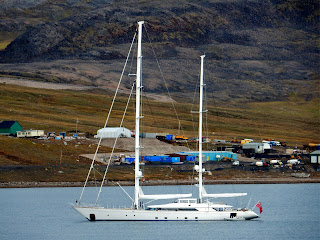JF returned from the Rio Olympics on August 24, but didn't begin teaching until the 25th. The plane landed in the community in the late afternoon, well after the conclusion of the school day. He must have been tired from all the travelling. He was originally scheduled to come back on the 22nd, but there were delays. When I saw him at school on the morning of August 25th, he was wearing his bright yellow & orange volunteer clothing, with a matching ball cap. I shook his hand and welcomed him back to the north.
I asked JF what it was like in Rio? He replied:
"Being a
volunteer at the Rio 2016 Summer Olympics was incredible. I got to experience a very different culture,
learn some Portuguese, [and] taste the local specialties. My personal favourites: Pão de queijo,
Churrasco, Feijoada and Caipirinha.
"I met people from many
different countries who were also volunteering at the Games (India, Sweden,
Columbia, Hong Kong, Holland, Estonia, Great Britain). I also went to some sporting competitions,
(women's basketball, field hockey, modern pentathlon, slalom canoe and kayak,
handball, track & field, beach volleyball), where I met tourists from all
over the world!
"Rio is a very big city with 6
million people. I noticed there was graffiti
everywhere and the Cariocas, (people who live in Rio), are very nice, like to
dance, and have a good time drinking beer!"
JF also mentioned that he was already thinking about
organizing an Olympic school activity in the very near future. More on this in a future post.
I got up early on Saturday, August 27 and was driven to
the Uquutaq Centre by Civilian Instructor (CI) A. Reid. (The Centre is the local Anglican Church). Today was the annual cadet beach clean up,
and everyone had been instructed to meet at the church for breakfast & briefing
at 9am. We arrived at the centre after
8:30am. The adult cooks were already in
the kitchen preparing breakfast. The
main course was sandwiches made with eggs, ham, cheese, bacon, and bread. They resembled Egg McMuffins from McDonald's,
but tasted better. For drinks, there
were juice boxes. The cadets slowly
trickled in after 9am and helped themselves to breakfast. We all ate at least two sandwiches each. Nothing beats homemade breakfast.
Once everyone had enough to eat, I briefed the cadets on the
area we would be cleaning. For the last
several years, 3045 Army Cadets has been cleaning the beach area behind the
local airport. This year, we would be
cleaning a section of coastline along the road that leads to the local
airport. We were told that a lot of
garbage had accumulated there and something needed to be done. The cadets & supplies were transported to
the area via pickup trucks, atv, and side-by-side. The atv pulled a trailer that we would use to
collect the garbage and transport it to the dump. I led the small convoy, driving the pickup
truck.
CI
Reid & I recruited two cadets to assist us in collecting all the necessary
supplies for the clean up activity several days in advance. We bought garbage bags, juice boxes, and
granola bars from the local Co-op store, and got Meals-Ready-to-Eat (MREs),
Coleman stoves, and a first aid kit from the cadet storage unit at the Gas
Station. The Health Centre staff donated
a box of plastic gloves. The recruited
cadets checked the Coleman stoves to make sure they worked.
We all put on plastic gloves and grabbed several black
garbage bags. We then went to work, seeking
out and picking up items that weren't supposed to be lying on the ground. Very large items, (including discarded wood),
were to be gathered into large piles and then loaded onto the trailer. The area was littered with large rocks but
there were some patches of green grass.
The skies were clear but there was a cold wind blowing.
 |
| No, those aren't rocks. They're garbage bags. |
As I have been saying since 2013, it always amazes me
what kind of garbage, or treasures, we find out on the land near the
community. The wind and water carry
these discarded items, small & large, across the bay where they come to
rest on the beach and/or get stuck in the rocks. It didn't take long for our garbage bags to
become full of chip bags, pop cans, plastic bags, small toys, torn up mitts,
shoes, and plastic oil cans. The larger
items we collected were rusted oil drums, tires, tricycles, Rubbermaid coolers,
and large pieces of wood. It took
several trips to the dump to offload everything we collected.
We used up all the garbage bags we bought. We could have kept going but the afternoon
had arrived and I could see the cadets were tired. The cadets posed for a group photograph
before they were driven home.
Three delegates from the Nunavut Government arrived in
Arctic Bay to hold a public meeting on the evening of August 30th. The meeting took place in the school's gym
and the delegates were looking for public input on the proposed changes to the
Nunavut Education Act. The last time the
act was amended/changed was in 2008. The
act was reviewed in 2015 and some recommendations were made. Some of the proposed changes include: a
standardized school calendar for the territory, better communication of the
needs of students, and extending the deadline to develop curriculum resources
in Inuktut.
A year or two after I began my Nunavut teaching career in
2012, Nunavummiut learned that the territory's education system would not be
able to meet the government's goal of creating a fully bilingual
(English-Inuktitut) system in 2019. At
the time, the reasoning was there wouldn't be enough trained Inuit
teachers/principals by then, but people were saying that there were other
reasons, as well. Some pointed to the
Education Act itself, saying it needed to be amended, and/or changed again to
fit the needs of the Inuit. (When
Nunavut became a territory in 1999, the Act was an exact copy of the
Northwest-Territories Education Act. The
process of changing the Act to fit Inuit values began several years later, with
the first revision in 2008).
The gym was set up with tables and chairs. The setup only occupied half of the gym. The food was prepared by Sarah & her
Grade 9 class. They did a really good
job. The delegates provided documents,
pamphlets, and USB sticks that explained the proposed changes to the Act. The information was produced in English and
Inuktitut syllabics. There were also
listening devices for everyone because the consultation would be conducted in
English & Inuktitut. Local Arctic
Bay resident, Mishak Allurut, was hired as the translator.
The delegates began the consultation by introducing
themselves. The audience consisted of
elders, community members, the principal of Inuujaq School, and several
teachers. I was also in attendance. The format of the meeting was
straightforward: the delegates would introduce the proposed change to the act
and then people in the audience were invited to give their opinions &
suggestions. Everyone spoke with a
microphone. I refrained from speaking; I
was mostly interested in what other people had to say.
A lot of opinions & suggestions were made, too many
to list in this post. Some of them were
that many wanted more resources produced in Inuktitut, better communication
between the government and the school boards, and more trained specialists in
special education & language. The
idea of a standardized school calendar had a mixed reception.
I didn't stay for the whole meeting because I had lessons
to prepare & work to correct. I
heard the meeting lasted until 10:30pm.
The only issue I had with the meeting was that not many people showed up
and that the delegates were leaving the next day. I know we live in a world of tight schedules,
but there should have been at least two days of consultations. (The delegates were visiting several
communities; not just Arctic Bay). I
hope the information collected will be considered and used.







































